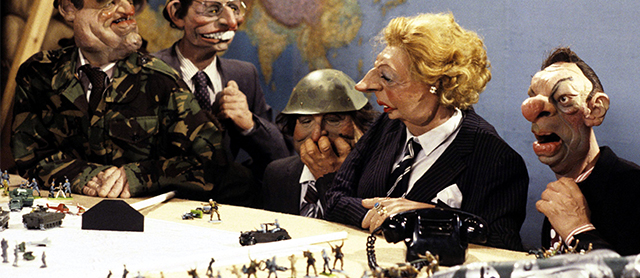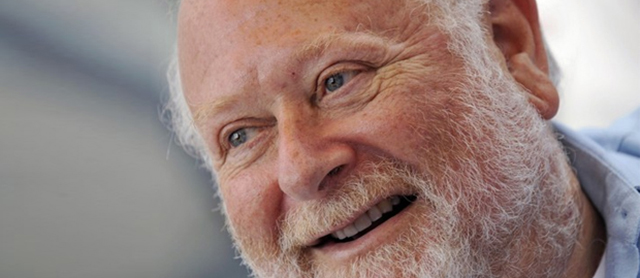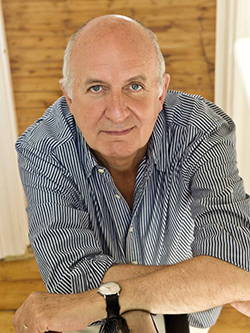
Spitting Image (ITV/Rex/Shuttersock)
Is laughing at politics a catalyst for change – or a substitute? With A View From Islington North about to open in the West End, we asked three brilliant satirists about the relationship between comedy and politics.
JONATHAN LYNN co-wrote Yes, Minister and Yes, Prime Minister. He wrote and directed Clue and Nuns on the Run and has directed films including The Whole Nine Yards. JOLYON RUBINSTEIN has won a BAFTA for writing and performing BBC3’s The Revolution Will Be Televised alongside Heydon Prowse. ALISTAIR BEATON wrote for Spitting Image and Not The Nine O’Clock News, and penned the TV films The Trail of Tony Blair and A Very Social Secretary. His play The Accidental Leader is premiered in A View From Islington North (the title of this article is a quote from the play).
Why does politics lend itself so well to comedy?

Jolyon Rubinstein
Jonathan Lynn: Insincerity, hypocrisy, self-righteousness, dishonesty and corruption are the ingredients of political activity. When these qualities are revealed in those who tell us how to live, what to think and what to do, the pleasure is irresistible.
Jolyon Rubinstein: Because the powerful dressing up the pursuit of their own rampant self interest as logical for the great unwashed is hilarious.
Alistair Beaton: Because it’s so serious. Its very hard to be funny about something that’s already funny.
What or who is ripe for satirical treatment at the moment?
JL: The target never changes: anyone who wants power over their fellow citizens.
JR: The left and right seem to both be simultaneously exploring their most extreme nether regions. Trump & sadly Zac Goldsmith seem to have ushered in the normalisation of open ‘no offence’ racism; whilst Sanders & Corbyn seem to have shown that collectivist, bottom-up hope needs silver hair and wrinkles to be considered authentic.
AB: Just about anyone who hasn’t yet faced up to climate change.
Tell us a piece of satire or political comedy you’ve particularly admired?
JL: The Government Inspector by Nikolai Gogol.
JR: Chris Morris and Brass Eye were a big influence on us.
AB: I love the savage intelligence of cartoonists such as Chris Riddell and Steve Bell. Going back in time, it’s hard to beat the Latin poets. Catullus is is up there with the best; he’s witty, filthy and fearless. Nowadays he’d probably be sued for libel.

Jonathan Lynn
Do you think satire has a purpose beyond entertainment – and do you think it ever succeeds?
JL: Satire is comedy with a purpose: it seeks to change society. But if it ever succeeds, which I doubt, the success is superficial and brief. Seven years of Yes Minister and Yes Prime Minister produced many laughs and some understanding of the way we’re governed – but no change for the better. I can’t think of a play that ever changed anything but that doesn’t mean there’s no point in making the effort: art is criticism of life and satire is criticism of life by ridicule. Absolutely necessary.
JR: Yes I do. Satire’s job is to ridicule the powerful by highlighting the absurdity of their deeds and actions. I think once you see the balloon of the most powerful pop we are all empowered. It reminds us that they are in fact just like us and that’s empowering.
AB: I’m not sure satire changes anything, but at the very least it fosters outrage – and gives heart to the losers.
Do you think there’s anything specific or unique about how the British portray the establishment?

Alistair Beaton
JL: British politicians are in trouble if they are perceived as having no sense of humour. We can get away with much more than satirists in many other countries because every politician dreads not being seen as a ‘good sport’. So satirists don’t get jailed or shot. Instead, the establishment embraces us, flatters us, and hands out OBEs and knighthoods to writers and comedians who are seen as a potential threat. Satirists are thus made part of the establishment, which is a much more sophisticated way of neutering them.
JR: Not particularly. We have a uniquely consolidated ‘establishment’ in London. It runs through the highest echelons of all our major industries and it’s as tightly kit as it’s ever been. Our establishment think they’ve won. They are vitriolic and have reframed their self interest as good for all of us, just like George Orwell said they would.
AB: There’s a healthy British tradition of irreverence towards power. But curiously, it’s mixed with a sickly respect for outdated institutions. What other country would fail to abolish the House of Lords? (Not to mention the House of Windsor).

 Search
Search
